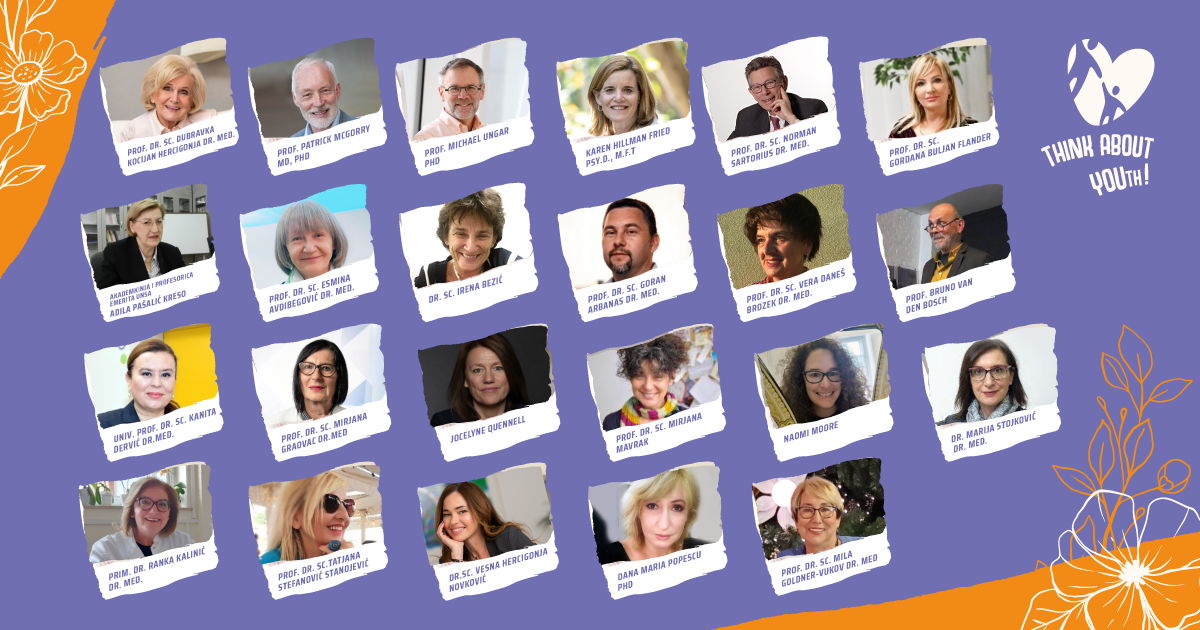
Renowned therapists and psychiatrists discuss key topics in the mental health of children, youth, and families
The 3rd International and Interdisciplinary Congress of Child and Adolescent Psychotherapy is approaching, which will bring together leading experts from various disciplines involved in the mental health and well-being of children, youth, and families.
Among the distinguished speakers will be Dr. Karen Hillman Fried, a marriage and family therapist from California and president of the Violet Oaklander Foundation. About the upcoming THINK ABOUT YOUth congress, Dr. Fried shares her excitement and gratitude: “Thank you to the wonderful professionals at BHIDAPA for organizing this congress dedicated to raising awareness, sharing knowledge, and fostering collaboration among individuals and organizations committed to improving the well-being of children. I am honored to be part of the congress and look forward to coming to Sarajevo in October.” Dr. Hillman Fried also emphasizes the importance of children’s development and spontaneity in learning: “Children already know how to grow, develop, learn, expand and discover, how to feel, laugh and cry, and how to get angry. They already know how to love and be joyful, how to live life fully, work and be strong and full of energy. All children know these things – and so does the child within us. All they – and we – need is an opportunity,” she quotes Violet Oaklander, whose ideas and methods Dr. Fried promotes and applies.
Prof. Mila Garner Vukov, MD-PhD a distinguished psychiatrist with extensive international experience, a member of the Royal Australian and New Zealand College of Psychiatrists, and an internationally certified systemic family and group psychotherapist, emphasizes the importance of the upcoming 3rd International and Interdisciplinary Congress of Child and Adolescent Psychotherapy in the contemporary understanding and treatment of mental illnesses in young people. “Issues such as low self-esteem, demoralization, and interpersonal challenges are increasingly common among today’s children and adolescents. The importance of understanding biological, cognitive, social, economic, and cultural factors in the development of these conditions is immense,” said Prof. dr. Garner Vukov. She also highlights the importance of epigenetics and the role of family and social environments in enhancing resilience in young people.
The congress will bring together experts from various fields, representatives of organizations, and youth, thus highlighting its multidisciplinarity and comprehensive approach to addressing issues.
Prof. Dr. Mila Garner Vukov points to the importance of recognizing intergenerational trauma as a key factor in the development of psychiatric problems in children and adolescents. “Intergenerational trauma—the process of transferring trauma from ancestors to subsequent generations, which can encompass up to five generations—is often linked with personal and family traumas such as suicides, prison sentences, and violent deaths, as well as with broader sociocultural traumas such as wars, political persecution, and migration. These hidden secrets manifest through symptoms that are often inexplicable, such as anger, confusion, and feelings of guilt in future generations,” explains Prof. Dr. Garner Vukov. She adds that understanding the dynamics of intergenerational trauma is crucial in the psychotherapeutic and psychiatric approach, both during the diagnostic and therapeutic processes. “Understanding the ‘Roots of Aggression and Erosion of Empathy’ can help in recognizing the emergence of addiction diseases, family violence, and suicide risks among young people. In countries with high rates of youth suicide, there is a clear link with intergenerational trauma that has caused an erosion of empathy on a sociocultural level, leading to aggression that manifests through family and societal violence, peer violence, and a wide range of psychiatric problems including antisocial personality disorders, depression, addictions, and suicides.” This statement underscores the importance of a holistic approach in understanding and treating mental difficulties and encourages deeper research to develop effective therapeutic approaches for young people facing complex mental challenges.
Dr. Mirela Badurina, founder and director of BHIDAPA and chair of the organizational and program committees, highlights the significance of an integrative, interdisciplinary, and intersectoral approach to the mental health and well-being of children and adolescents. She states: “The tradition of our congress activities THINK ABOUT YOUth allows professionals from different disciplines to exchange knowledge and experiences, which is crucial for developing effective services tailored to the needs of young people. The congress activities also open space to hear the voice of young people, whose role is extremely significant in organizing support services tailored to the needs of children and young people. By adopting this approach, our desire is to emphasize how the active involvement of young people is crucial for redesigning support and reducing stigma. Without their involvement, it is difficult to achieve changes that correspond to the real needs and challenges faced by children and young people, making their engagement not only valuable but also necessary for developing a more effective and integrated approach in the field of mental health for children and young people. For example, involving young people in program planning helps identify specific challenges and create tailored interventions that promote long-term well-being.”
The congress is attracting great interest and will take place in Sarajevo from October 3rd to 6th. This event provides an extraordinary opportunity for professionals from different disciplines to exchange knowledge and experiences, and to collectively contribute to improving practices in the field of mental health and well-being of children and adolescents. For more information about the congress, visit the official website: congress.bhidapa.ba.
